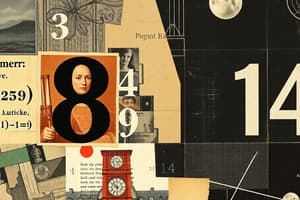Podcast
Questions and Answers
Which type of numbers can be expressed as a fraction?
Which type of numbers can be expressed as a fraction?
- Rational Numbers (correct)
- Natural Numbers
- Irrational Numbers
- Real Numbers
Integers can have a fractional part.
Integers can have a fractional part.
False (B)
Define irrational numbers.
Define irrational numbers.
Numbers that cannot be expressed as a finite decimal or fraction and have an infinite number of non-repeating digits.
The product of a rational number and the sum of two rational numbers is equal to the sum of the products. This property is known as ____________.
The product of a rational number and the sum of two rational numbers is equal to the sum of the products. This property is known as ____________.
Match the following properties of rational numbers with their descriptions:
Match the following properties of rational numbers with their descriptions:
Flashcards are hidden until you start studying
Study Notes
Number System Class 9th
Real Numbers
- Real numbers are a combination of rational and irrational numbers.
- They can be represented on the number line.
- Examples: 3, 0.5, π, √2, etc.
Irrational Numbers
- Irrational numbers are numbers that cannot be expressed as a finite decimal or fraction.
- They have an infinite number of digits that never repeat in a predictable pattern.
- Examples: π, e, √2, etc.
Rational Numbers
- Rational numbers are numbers that can be expressed as a fraction (p/q) where p and q are integers and q ≠ 0.
- They can be expressed as a finite decimal or a recurring decimal.
- Examples: 3/4, 22/7, 0.5, etc.
Integers
- Integers are whole numbers, either positive, negative, or zero.
- They do not have a fractional part.
- Examples: ..., -3, -2, -1, 0, 1, 2, 3, ...
Properties of Rational Numbers
- Closure: The sum, difference, product, and quotient of two rational numbers is always a rational number.
- Commutativity: The order of rational numbers does not change the result of addition and multiplication.
- Associativity: The order in which rational numbers are added or multiplied does not change the result.
- Distributivity: The product of a rational number and the sum of two rational numbers is equal to the sum of the products.
Whole Numbers
- Whole numbers are positive integers, including zero.
- Examples: 0, 1, 2, 3, ...
- Whole numbers are a subset of integers.
Types of Numbers
- Natural Numbers: Positive integers, starting from 1. (1, 2, 3, ...)
- Whole Numbers: Positive integers, including zero. (0, 1, 2, 3, ...)
- Integers: Whole numbers, either positive, negative, or zero. (...,-3, -2, -1, 0, 1, 2, 3, ...)
- Rational Numbers: Numbers that can be expressed as a fraction. (3/4, 22/7, 0.5, etc.)
- Irrational Numbers: Numbers that cannot be expressed as a finite decimal or fraction. (π, e, √2, etc.)
- Real Numbers: A combination of rational and irrational numbers.
About Pi (π)
- Pi (π) is an irrational number, approximately equal to 3.14159.
- It is a universal constant, representing the ratio of a circle's circumference to its diameter.
- Pi is a transcendental number, meaning it is not the root of any polynomial equation with integer coefficients.
Number System Class 9th
Real Numbers
- A combination of rational and irrational numbers.
- Can be represented on the number line.
- Examples: 3, 0.5, π, √2, etc.
Irrational Numbers
- Cannot be expressed as a finite decimal or fraction.
- Have an infinite number of digits that never repeat in a predictable pattern.
- Examples: π, e, √2, etc.
Rational Numbers
- Can be expressed as a fraction (p/q) where p and q are integers and q ≠ 0.
- Can be expressed as a finite decimal or a recurring decimal.
- Examples: 3/4, 22/7, 0.5, etc.
Integers
- Whole numbers, either positive, negative, or zero.
- Do not have a fractional part.
- Examples: ..., -3, -2, -1, 0, 1, 2, 3,...
Properties of Rational Numbers
- Closure: Sum, difference, product, and quotient of two rational numbers is always a rational number.
- Commutativity: Order of rational numbers does not change the result of addition and multiplication.
- Associativity: Order in which rational numbers are added or multiplied does not change the result.
- Distributivity: Product of a rational number and the sum of two rational numbers is equal to the sum of the products.
Whole Numbers
- Positive integers, including zero.
- Examples: 0, 1, 2, 3,...
- Whole numbers are a subset of integers.
Types of Numbers
- Natural Numbers: Positive integers, starting from 1.
- Whole Numbers: Positive integers, including zero.
- Integers: Whole numbers, either positive, negative, or zero.
- Rational Numbers: Numbers that can be expressed as a fraction.
- Irrational Numbers: Numbers that cannot be expressed as a finite decimal or fraction.
- Real Numbers: A combination of rational and irrational numbers.
About Pi (π)
- An irrational number, approximately equal to 3.14159.
- A universal constant, representing the ratio of a circle's circumference to its diameter.
- A transcendental number, meaning it is not the root of any polynomial equation with integer coefficients.
Studying That Suits You
Use AI to generate personalized quizzes and flashcards to suit your learning preferences.




